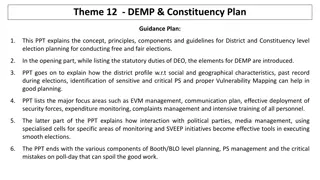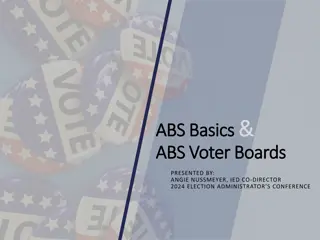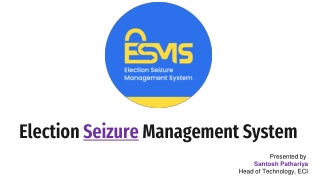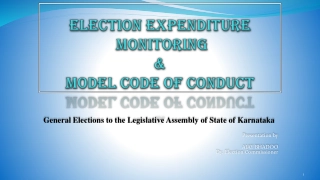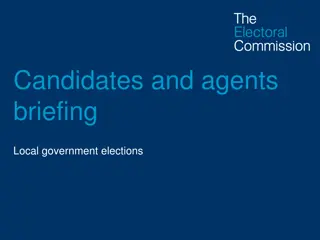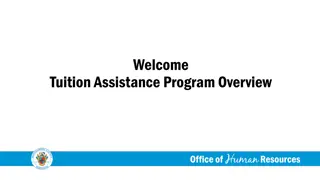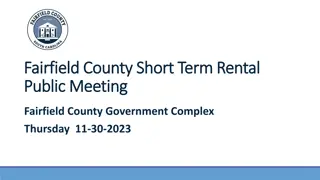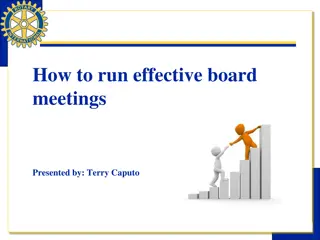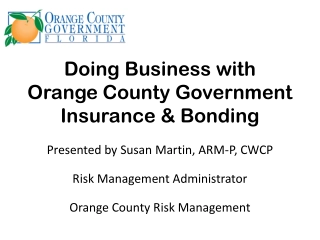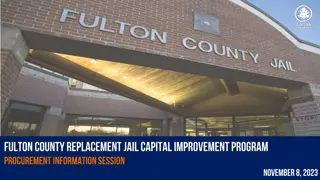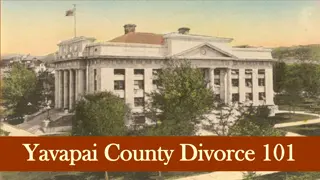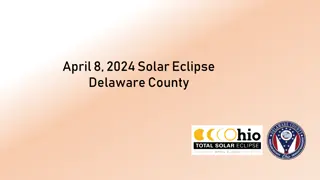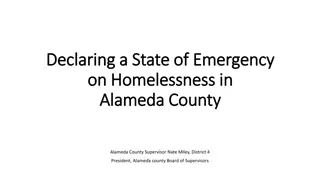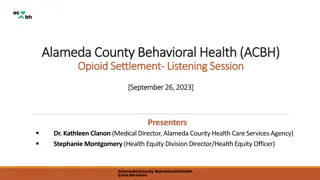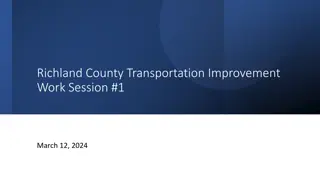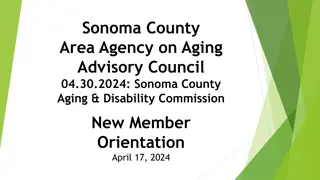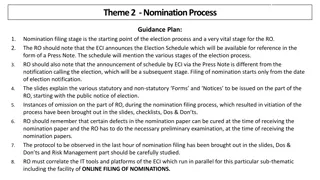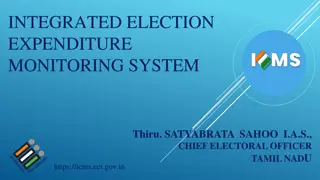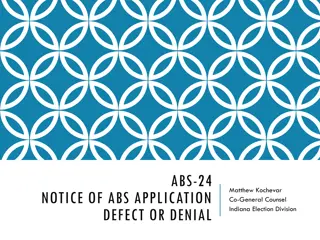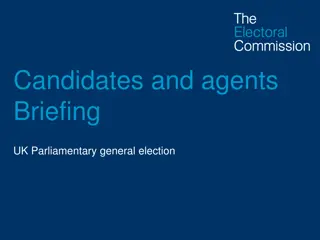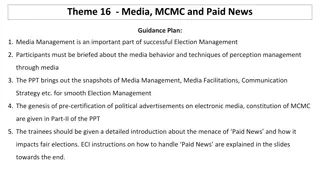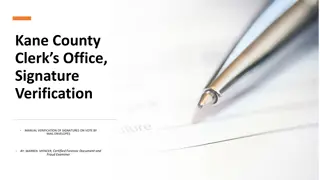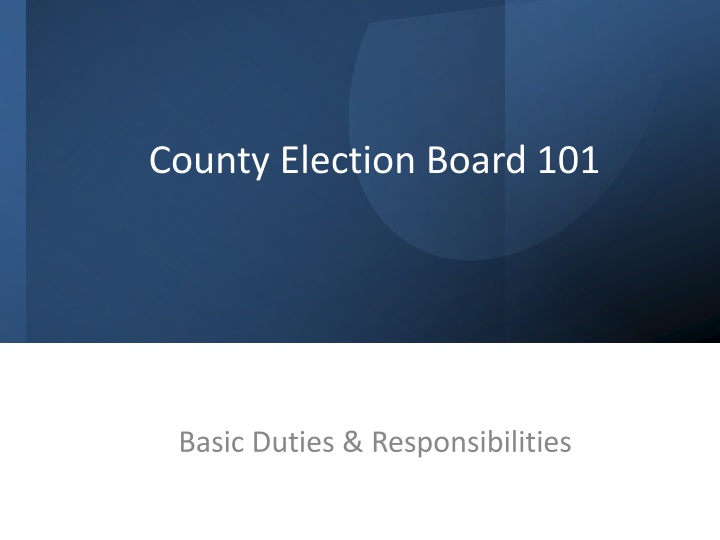
County Election Board 101
Basic duties and responsibilities of the County Election Board, including voter registration and administration of public elections. It covers the composition of the board, qualifications of its members, officer roles, board minutes, budget estimates, and proxy usage.
Download Presentation
Please find below an Image/Link to download the presentation.
The content on the website is provided AS IS for your information and personal use only. It may not be sold, licensed, or shared on other websites without obtaining consent from the author. Download presentation by click this link. If you encounter any issues during the download, it is possible that the publisher has removed the file from their server.
- county election board
- voter registration
- board composition
- officer roles
- board minutes
- budget estimates
- proxy usage
Presentation Transcript
County Election Board 101 Basic Duties & Responsibilities
Title 3 of the Indiana Code covers election Nearly all election duties of the county election board, circuit court clerk, and county voter registration officials are located in Title 3 Title 3 covers two essentially processes Voter registration Administration of election of public offices and referendums State Election Code
Who administers elections locally? County Election Boards Combined Boards of Election and Registration Lake & Tippecanoe & Porter Who conducts voter registration locally? County voter registration office is either: Circuit Court Clerk Combined Boards of Elections and Registration Separate Board of Registration Local Election and Registration Agencies Allen, LaPorte, Madison, Marion, St. Joseph, Vanderburgh, and Vigo IC 3-6-5 | IC 3-6-5.2 | IC 3-6-5.4 | IC 3-6-5.6 | IC 3-5-2-16.2
County Election Boards Most county election board consists of 3 members: Circuit Court Clerk Two appointees nominated by major party county chairs and appointed by the clerk using the CEB-6 These appointed members serves until they resign or County Chair may remove and nominate a new appointed member at any time Appointed members have no set term of office IC 3-6-5-5 | IC 3-6-5-6
CEB Member Qualifications Appointed county election board members or their proxies may not be candidates or officeholders Running for party offices (delegate, PC) is not running for elected office County election board members may not be a member (chairman or treasurer) of a candidate s committee Exception: Circuit court clerk may be a member of the clerk s candidate committee Appointed members of the board may not be a relative of the person appointing them Lake/Tippecanoe/Porter the appointing authority is the county party chair All other counties the appointing authority is the county clerk Relative means a spouse, parent, child, sibling, aunt, uncle, niece, nephew, grandparent or grandchild IC 3-6-5-3 | IC 3-6-5.9-3
CEB Officer Roles Circuit Court Clerk is an ex officio member (as part of the job as clerk) of the board and serves as secretary of the board If running for any elected office, clerk continues to serve in this capacity without restriction but for: Generic seal as issued by IED must be used on provisional & ABS ballots Clerk s signature cannot appear on the ballot The county election board must select one of its appointed members to serve as chair (other member may be called vice-chair but not required) The chair calls meetings when the chair considers it necessary If the chair fails to call a meeting then the two other members may meet to perform the duties of the board IC 3-6-5-8 | IC 3-6-5-11 | IC 3-6-5-12
Board Minutes CEBs are required to have minutes for each meeting Meeting minutes must be permanently maintained by the circuit court clerk The minutes should never be destroyed or leave the clerk s office Minutes must be available within a reasonable time after meeting and must include: Date, time, and place of meeting Members present or absent The general substance of all matters discussed and decided at meeting Written record of all yes/no votes of each member on all questions coming before the board IC 3-6-5-13 | IC 5-14-1.5-4
Budget Estimates The county executive and fiscal body has the general responsibility to budget and pay for all election and voter registration expenses throughout the year The CEB has the duty to prepare an annual budget estimate: Itemizing all expenditures incur during the calendar year Estimating funding necessary for covering expenses for the next calendar year The CEB must submit estimate at same time and manner that other county estimates are submitted IC 3-5-3 | IC 3-6-5-16
Members may have proxies and alternate proxies to act in the place of a board member when the board member cannot be present or other reason Proxies must be in writing and filed with the circuit court clerk Proxies may be limited to a specific meeting or issue within a meeting or unlimited It is a good idea for members to appoint proxies in case of emergency when a member is unavailable A member can have a permanent proxy on file at the clerk s office in case the member cannot attend a meeting or execute an election duty imposed by the Title 3 Proxies IC 3-6-5-4.5
CEB Operations County election board s authority is exercised by majority vote unless unanimous vote required by a specific state law Numerous examples where unanimous vote of the entire membership of the board is required Establishing satellite early voting locations Some resolutions or orders of the board continue until revoked or rescinded Vote center plan Some resolutions or orders expire at the end of the year adopted Omitting the use of poll sheriffs and clerks at polling locations IC 1-1-4-1
CEB Operations County election board does not have Home Rule powers to adopt its own election laws County election board administers the state election laws within the county Board holds primary responsibility to conduct elections in accordance with state law There are many state election laws that give county election board s the authority to choose from options to apply in county Establishing vote center model of election day voting Using Electronic Pollbooks Establishing satellite early voting locations IC 36-1-3-8 | IC 3-6-5-14
CEB Operations What Procedures Must a CEB follow? Those spelled out in state law: Election Laws Open Door Law Public Records Law Other procedures for conducting meetings: Chair generally leads the meeting Issues before the board can generally be resolved on motion and vote Agenda not required but can be useful but can t take an official action based solely on an agenda item number More formal Robert s Rules of Order may be used Other procedures may be required or useful depending upon the issue IC 5-14-1.5-4(a)
Administering Election Two major roles of every county election board General administration of voting: Ballot preparation and approval Appoint and train absentee boards and poll workers Voting systems testing and delivery of voting equipment Canvass and certify results Judicial-type proceedings related to elections: Candidate challenges Campaign finance enforcement Absentee ballot application mailing identification requirement enforcement Provisional ballot determinations State election law violations HAVA Title III complaints IC 3-6-5-14 | IC 3-6-6-11 | IC 3-6-6-40 | IC 3-11-13-22 | IC 3-11-14.5 | IC 3-11.5-4-23 | IC 3-12-4 | IC 3-9-4
Title 3 provides which official is execute duty or responsibility If statute says CEB then CEB act at public meeting to accomplish duty If statute says clerk then clerk acts by deadline if necessary Sometime statute give multiple bodies the same duty so any of those bodies to act to accomplish that duty The power to review and approve/reject absentee ballot apps is given to ABS board and CEB Statutory Duties But there are exceptions
Assigning Clerk Duties By unanimous vote the CEB can adopt a resolution providing that some or all of clerk s election duties are to be performed by a CEB employee (i.e. election director) The resolution must specify the clerk s duties and responsibilities to be exercised by board employee The resolution can only be amended or repealed by unanimous vote Expires 60 days after the clerk leaves office Marion and Allen county have adopted this resolution IC 3-6-5-14.5
Assigning CEB Duties to Clerk The CEB may assign any of its powers or duties to be exercised by the clerk whenever the facilities of the clerk s office make it more reasonable and efficient for the clerk to exercise the board s power Only requires a majority vote Recommended that this be done by written resolution to make clear who CEB duties or responsibilities are being given to clerk Any action taken by the clerk with approval of the board is considered an action of the board IC 3-6-5-19
Board Employees CEB can hire employees to assign CEB duties and day to day functions Two bipartisan deputy election commissioners Chosen by D & R county chairs & must be resident of the county Can be assigned to exercise CEB duties as stated in rules adopted by CEB Clerk, custodian, and other employees Hired as necessary to execute CEB powers Employees of the board cannot become candidates for elected office or be a candidate when hired If employee runs for office they automatically resign position IC 3-6-5-20 | IC 3-6-5-21 | 3-6-5-22 | IC 3-6-5-23 | IC 3-6-5-24
Jurisdiction in Other Counties During Municipal Election Normally CEB exercises duties and responsibilities in their county only During municipal election cycle some CEBs have oversight over election in cities and towns that cross county line The CEB with the greatest percentage of the city or town population become responsible for conducting election in the city or town in all counties Designating polling location in municipality on both sides of the county line Appoint poll workers Certify final election results and issuing certificates of election IC 3-6-5-15 | IC 3-12-5-2
Canvassing Canvassing is the process by which the determines the results for each candidate and public question on the ballot Including using appointed bipartisan team to determine how many write-in votes any declared write-in candidate received Beginning at 6 pm on election day the CEB must meet to canvass all certificates, polls lists, and tally papers returned to CEB to determine and declare the results of the election Follow Open Door Law procedures like any other CEB meeting Use of voting system election management system (EMS) does most of the work to calculate precinct and office level results by totaling election day, absentee, and provisional ballots together determine results CEB may review results in EMS against tabulator tally paper produced after election day and absentee votes are tallied IC 3-12-4
CEB must upload unofficial results into SVRS at: 8 pm 10 pm midnight Continue uploading results into SVRS beginning at 9 am the day after election day and hourly until all unofficial results are entered Canvassing IC 3-12-4-6.3
Judicial Type Proceedings Campaign Finance/Absentee Ballot Application Mailing Identification hearings have special procedures Administrative Orders and Procedures Act (IC 4-21.5) IED has templates for campaign finance enforcement/Discuss in next presentation Candidate challenges/provisional ballot determinations/state election law violations Due process requirements of notice and opportunity to be heard apply HAVA Administrative Complaint Procedure has detailed statutory requirements and steps IC 3-9-4-17 | IC 4-21.5 | IC 3-6-5.1 | IC 3-6-5-31 | IC 3-8-2-14
Candidate Challenges Sample reasons a candidate may be challenged: Party affiliation in a primary Residence requirement for the office not met Not a registered voter of the election district by deadline to file as a candidate Felony Conviction A CAN-1 candidate challenge form must be filed with CEB through clerk for CEB to conduct challenge hearing Registered voter of the election district; or County chair of major party in a county in which part of the election district located Challenges may not be accepted for filing after the applicable deadline IC 3-8-1-2 | IC 3-8-1-5 | IC 3-5-4-1.9 | IC 3-8-2-14
Candidate Challenges Deadlines to file CAN-1 Primary candidate: noon Feb. 10 Write-in candidate (except school board): noon Aug. 11 Vacancy and Petition candidates: noon Aug. 25 Deadlines to decide CAN-1 Primary candidate: noon Feb. 23 Write-in candidate (except school board): noon Aug. 18 Vacancy and Petition candidates: noon Sep. 8 Small town convention or petition candidate: noon Sep. 12 Small town convention or petition candidate: noon Sep. 5 IC 3-8-2-14 | IC 3-8-2.5-7 | IC 3-8-5-14.7 | IC 3-8-6-14 | IC 3-13-1-16.5
Candidate Challenges Provide notice of the hearing to challenger and challenged candidate Other suggested procedures Sworn testimony with oath administered by any CEB member Establish order of presentations and time limits Consider whether you need county attorney to advise at hearing Technical rules of evidence do not apply but may be useful to limit unreliable or repetitive evidence Consider whether you need security at hearing Consider tape recording Just minutes are required but a recording may facilitate review by a court IC 3-6-5-26 | IC 3-8-2-14
Election Law Violation Investigating alleged election law violations is a two-step process First CEB can investigate state election law violations if it finds there is substantial reason to believe an election law violation has occurred If CEB finds, by majority vote, that there is a substantial reason to believe an election law violation occurred then CEB must: Hold hearing on the violation Provide notice to individual(s) that filed complaint and person(s) alleged to have committed violation Give opportunity to be heard to party alleged to have or about to violate state election law If in judgment of CEB a person has engaged or is about to engage in a violation of election law then CEB may take appropriate action to stop violation from occurring This includes referring matter to prosecutor if an election crime Election crime is conduct described in IC 3-14 IC 3-6-5-31


